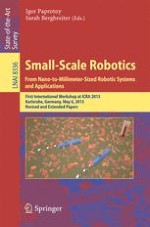2014 | OriginalPaper | Buchkapitel
From Nanohelices to Magnetically Actuated Microdrills: A Universal Platform for Some of the Smallest Untethered Microrobotic Systems for Low Reynolds Number and Biological Environments
verfasst von : Tian Qiu, John G. Gibbs, Debora Schamel, Andrew G. Mark, Udit Choudhury, Peer Fischer
Erschienen in: Small-Scale Robotics. From Nano-to-Millimeter-Sized Robotic Systems and Applications
Verlag: Springer Berlin Heidelberg
Aktivieren Sie unsere intelligente Suche, um passende Fachinhalte oder Patente zu finden.
Wählen Sie Textabschnitte aus um mit Künstlicher Intelligenz passenden Patente zu finden. powered by
Markieren Sie Textabschnitte, um KI-gestützt weitere passende Inhalte zu finden. powered by
Building, powering, and operating structures that can navigate complex fluidic environments at the sub-mm scale are challenging. We discuss some of the limitations encountered when translating actuation mechanisms and design-concepts from the macro- to the micro-scale. The helical screw-propeller or drill is a particularly useful geometry at small scales and Reynolds numbers, and is one of the mechanisms employed by microorganisms to swim. The shape necessarily requires three-dimensional fabrication capabilities which become progressively more challenging for smaller sizes. Here, we report our work in building and operating these screw-propellers at different sizes. We cover the length scales from the sub 100 nm to drills that are a few hundred microns in length. We use a known physical deposition method to grow micron-sized magnetic propellers that we can transfer to solutions. We have recently succeeded in extending the fabrication scheme to grow nanohelices, and here we briefly review the technical advances that are needed to grow complex shaped nanoparticles. The microstructures can be actuated by a magnetic field and possible applications of the micro- and nanohelices are briefly discussed. We also present a system of polymeric micro-screws that can be produced by micro-injection molding and that can be wirelessly driven by an external rotating magnetic field through biological phantoms, such as agarose gels with speeds of ~200
μ
m/s. The molding technique faithfully reproduces features down to a few microns. These microdrills can serve as a model system to study minimally invasive surgical procedures, and they serve as an efficient propeller for wireless microrobots in complex fluids. The fabrication scheme may readily be extended to include medically approved polymers and polymeric drug carriers.
